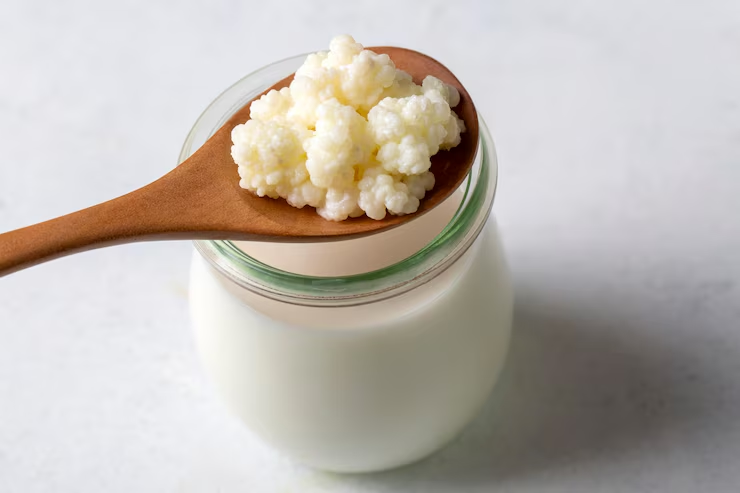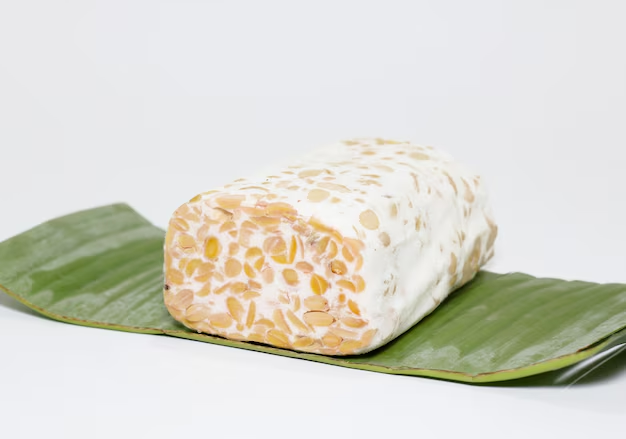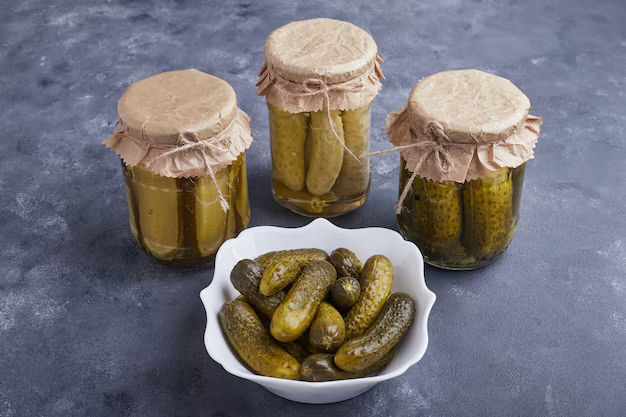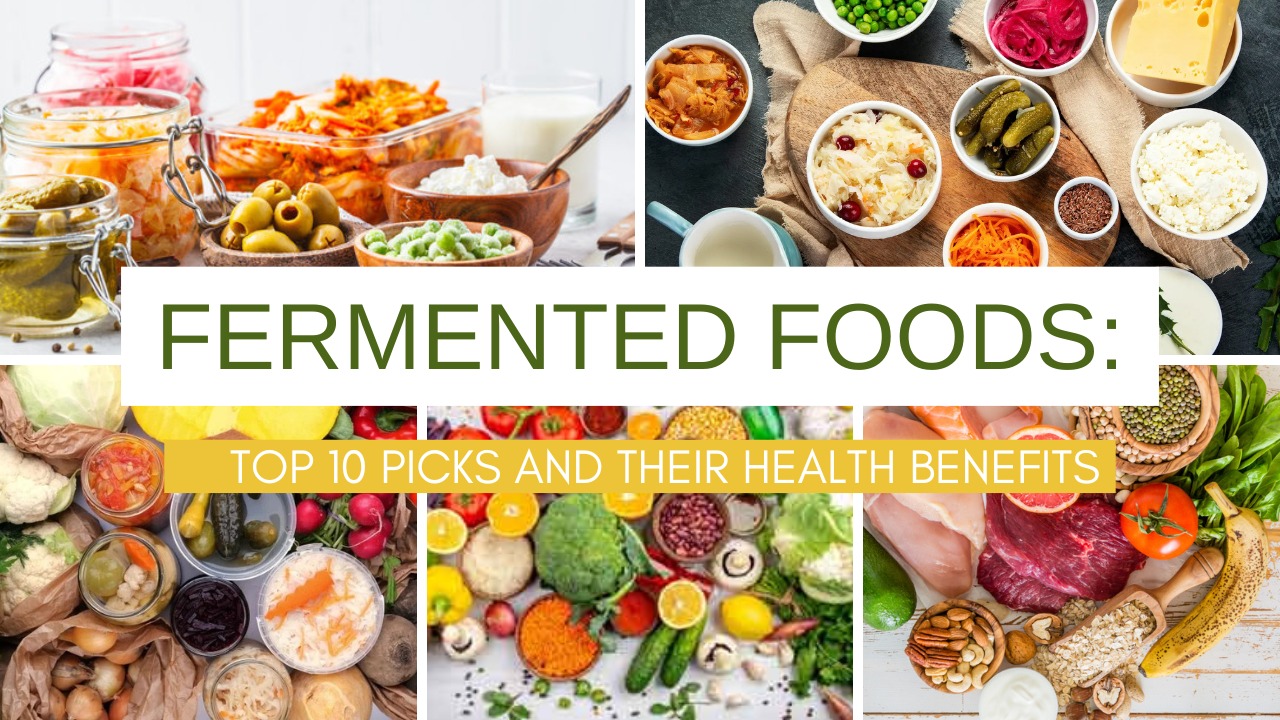Fermented foods are those that have been through a process of fermentation, where natural bacteria break down sugars and starches into acids or alcohol. This process not only helps preserve the food but also enhances its nutritional value. Common examples of fermented foods include yogurt, kefir, kimchi, sauerkraut, miso, and kombucha.
Fermented foods are known for being rich in probiotics, which are beneficial bacteria that support gut health. These foods can help improve digestion, boost the immune system, and may even have mood-boosting effects. They also provide essential vitamins like B12, and minerals such as zinc and magnesium.
Including fermented foods into your diet can be a simple way to promote overall health. However, it’s important to choose varieties that are naturally fermented without added sugars or preservatives to reap the full benefits. These foods offer a flavorful, health-boosting addition to meals.
What Are Fermented Foods ?

Fermented foods are those that have undergone a controlled process where natural bacteria or yeasts break down carbohydrates like sugars and starches into alcohol or organic acids. This metabolic process, known as fermentation, not only preserves the food but also improves its nutritional quality.
Fermentation has been practiced for thousands of years across different cultures. It’s a natural method of food preservation that enhances flavors and makes food easier to digest. Foods like kimchi from Korea, sauerkraut from Germany, and dosa batter from India are all examples of fermented foods, each offering unique flavors and health benefits.
The fermentation process increases the levels of beneficial bacteria, known as probiotics, which support gut health. These probiotics help with digestion, strengthen the immune system, and may even boost mood and energy levels. Fermented foods are also rich in vitamins, including B12, and minerals like zinc and magnesium, making them a great addition to any diet.
Including fermented foods in your meals can be a simple way to improve digestion and overall well-being. For the best benefits, look for options that are naturally fermented, without added sugars or preservatives, to get the full nutritional value.
The Importance of Fermented Foods
Digestive Health: One of the most well-known benefits of fermented foods is their probiotic content—live, beneficial bacteria that play a crucial role in maintaining gut health. A healthy gut microbiome is essential for smooth digestion, preventing bloating, and ensuring overall gastrointestinal wellness. By introducing these probiotics into your diet, you support the natural balance of good bacteria in the digestive system, which can improve gut function and reduce discomfort.
Enhanced Nutrient Absorption: Fermentation helps break down nutrients into simpler forms, making them easier for the body to absorb. For example, in dairy products, the process of fermentation partially breaks down lactose, which can make these foods more tolerable for individuals with lactose sensitivity or intolerance. This improvement in nutrient absorption means that the body can better utilize the vitamins and minerals in fermented foods for overall health.
Immune System Support: Around 70% of the body’s immune system is located in the gut, making gut health vital to immune function. A thriving gut microbiota, supported by the probiotics found in fermented foods, can strengthen the body’s ability to defend against harmful pathogens. Consuming fermented foods regularly helps nurture a healthy gut, which can enhance immune responses and reduce the likelihood of infections.
Mental Health Benefits: Emerging research highlights a strong connection between the gut and the brain, often referred to as the “gut-brain axis.” The probiotics in fermented foods can have a positive impact on mental well-being. Studies suggest that a healthy gut microbiome may help improve mood, reduce anxiety, and even alleviate some symptoms of depression, showing that digestive health plays a key role in emotional and mental health.
Natural Detoxification: Fermented foods are known for their ability to support liver function and promote detoxification in the body. Thanks to their antioxidant and probiotic properties, these foods can help the liver process and eliminate harmful compounds more effectively. Regular consumption of fermented foods can support the body’s natural detox pathways, helping to rid the body of toxins and keep it functioning optimally.
Top 10 Fermented Foods and Their Benefits
Let’s dive into the world’s most revered fermented foods. Each of these has unique origins, flavors, and health advantages.
Yogurt

Yogurt is a popular dairy product made by fermenting milk with live bacterial cultures. It’s one of the most well-known fermented foods and is rich in probiotics, which are beneficial bacteria that support gut health. The fermentation process not only makes yogurt easier to digest but also enhances its nutritional content, including essential vitamins like B12 and calcium, which are important for bone health.
Consuming yogurt regularly can improve digestion, reduce bloating, and boost immune function. It can also be a great option for individuals who are lactose intolerant since the fermentation process helps break down much of the lactose in the milk. Adding yogurt to your diet is an easy and tasty way to enjoy the benefits of fermented foods and promote overall health, especially digestive well-being.
Origin: Ancient Mesopotamia
Main Ingredients: Milk (cow, goat, or plant-based) and live bacterial cultures
Benefits:
High in probiotics: Improves gut flora balance
Rich in calcium and protein: Supports bone health
Lactose digestion: Easier on lactose-intolerant individuals
Immune support: Encourages production of immune-boosting cells
Best Tip: Opt for plain, unsweetened yogurt with live and active cultures for maximum benefits.
Kimchi
Kimchi is a traditional Korean dish made from fermented vegetables, primarily napa cabbage and radishes, seasoned with chili pepper, garlic, ginger, and various spices. As one of the most well-known fermented foods, kimchi is rich in probiotics, which are beneficial bacteria that promote gut health. The fermentation process also boosts its nutritional content, offering vitamins such as A, B, and C, as well as antioxidants that support overall well-being.
Including kimchi in your diet can aid digestion, reduce bloating, and improve immune function. The probiotics found in kimchi help balance the gut microbiome, which plays a crucial role in digestion and health. This spicy, tangy dish not only enhances the flavor of meals but also provides the numerous health benefits of fermented foods, making it a flavorful and nutritious addition to your diet.
Origin: Korea
Main Ingredients: Napa cabbage, radish, garlic, ginger, red chili pepper, and fermented seafood
Benefits:
Probiotic-rich: Enhances gut and immune health
High in fiber: Promotes digestion
Rich in vitamins A, B, and C
Anti-inflammatory: Contains antioxidants and phytonutrients
Bonus: Kimchi has been shown to reduce cholesterol and may help in weight management due to its low-calorie content.
Sauerkraut

Sauerkraut is a traditional German dish made from finely chopped cabbage that has been fermented with lactic acid bacteria. As a popular example of fermented foods, sauerkraut is packed with probiotics, which are beneficial bacteria that promote a healthy gut. The fermentation process helps break down the cabbage, making it easier to digest and increasing its nutritional value, including a good source of fiber and vitamin C.
Regular consumption of sauerkraut can support digestive health, reduce bloating, and enhance immune function. The probiotics found in sauerkraut help balance the gut microbiome, which plays a vital role in digestion and overall health. As a flavorful and versatile food, sauerkraut provides the numerous benefits of fermented foods, making it a great addition to a balanced diet while boosting gut health and improving digestion.
Origin: Germany
Main Ingredients: Finely shredded cabbage and salt
Benefits
Improves digestion: Packed with live cultures
Rich in iron and vitamin C: Boosts energy and immunity
Supports heart health: Lowers blood pressure and cholesterol
Anti-cancer properties: Contains glucosinolates
Serving Idea: Use as a topping on sandwiches, salads, or as a side dish.
Kombucha
Kombucha is a fizzy, slightly tangy beverage made by fermenting sweetened tea with a symbiotic culture of bacteria and yeast, also known as a SCOBY. It’s a popular choice among fermented foods due to its refreshing taste and health-boosting properties. During fermentation, the tea develops probiotics, organic acids, and antioxidants, which support digestive and immune health.
Drinking kombucha regularly may help improve gut health by introducing beneficial bacteria into the digestive system. These probiotics support a balanced gut microbiome, which can lead to better digestion, reduced bloating, and improved energy levels. As one of the most accessible fermented foods, kombucha is often enjoyed as a healthy alternative to sugary drinks and sodas, offering both taste and health benefits in one bottle.
Origin: China (approx. 220 B.C.)
Main Ingredients: Tea, sugar, and a SCOBY (Symbiotic Culture Of Bacteria and Yeast)
Benefits:
Detoxifies the liver
Boosts energy: Contains B vitamins and iron
Enhances mood: May reduce symptoms of depression
Aids digestion: Thanks to its acetic acid and probiotics
Caution: Commercial versions may contain high sugar—read labels carefully.
Miso

Miso is a traditional Japanese paste made by fermenting soybeans with salt and a type of mold called koji. It is commonly used to flavor soups, marinades, and sauces. As one of the most nutrient-rich fermented foods, miso contains beneficial probiotics that support gut health. It also provides essential nutrients like protein, vitamins, and minerals, making it both flavorful and nourishing.
Adding miso to your meals can aid digestion, strengthen the immune system, and support overall health. The probiotics in miso help balance the gut microbiome, which plays a key role in digestive and immune functions. As part of a healthy diet, miso offers a savory and versatile way to enjoy the many benefits of fermented foods, while adding depth and richness to a variety of dishes.
Origin: Japan
Main Ingredients: Soybeans, salt, and koji (a fungus starter)
Benefits
Boosts immunity: Rich in probiotics and antioxidants
Heart-healthy: Lowers blood pressure
Supports brain health: Contains manganese and zinc
Anti-aging: Helps reduce inflammation and oxidative stress
Culinary Use: Popularly used in miso soup, marinades, and dressings.
Tempeh
Tempeh is a traditional Indonesian food made from fermented soybeans that are formed into a firm, cake-like block. It is a high-protein plant-based food and a popular meat substitute. As one of the most nutritious fermented foods, tempeh contains probiotics that support gut health, along with important nutrients like fiber, iron, and calcium. Its fermentation process also makes it easier to digest compared to other soy products.
Eating tempeh regularly can improve digestion, promote a healthy gut microbiome, and support muscle health due to its rich protein content. It also adds a nutty, earthy flavor to dishes and can be cooked in many ways, such as grilling, frying, or steaming. Including tempeh in your diet is a tasty and healthy way to enjoy the many benefits of fermented foods while getting essential nutrients.
Origin: Indonesia
Main Ingredients: Fermented soybeans
Benefits:
High in plant-based protein
Rich in calcium and iron
Supports muscle repair
Improves gut health due to natural probiotics
Lowers cholesterol: Isoflavones in soy help regulate lipid levels

Fun Fact: Tempeh has a firmer texture than tofu and a nutty flavor.
Kefir
Kefir is a cultured dairy drink made by fermenting milk with kefir grains, which contain a mix of bacteria and yeast. It has a tangy taste and a creamy texture, similar to drinkable yogurt. As one of the most beneficial fermented foods, kefir is packed with probiotics that support gut health. It also provides protein, calcium, and B vitamins, making it a nutritious addition to your daily routine.
Drinking kefir regularly can help improve digestion, strengthen the immune system, and support bone health. Because the fermentation process breaks down much of the lactose, kefir is often easier to digest for people with lactose sensitivity. Including kefir in your diet is a simple and effective way to enjoy the health benefits of fermented foods, while also adding a delicious and refreshing drink to your meals.
Origin: Caucasus Mountains
Main Ingredients: Milk and kefir grains (a mixture of bacteria and yeast)
Benefits
Potent probiotic source: Contains 30+ strains of bacteria
Antibacterial properties
Bone health: Rich in calcium and vitamin K2
Improves digestion: Especially effective for lactose intolerance
Pro Tip: Blend with fruit for a probiotic smoothie.
Pickles (Lacto-fermented)
Lacto-fermented pickles are cucumbers preserved through natural fermentation using salt and water, rather than vinegar. This process allows beneficial bacteria, such as Lactobacillus, to thrive and create a sour flavor while also enhancing the nutritional value. As a type of fermented foods, these pickles are rich in probiotics that support a healthy gut and aid digestion. They also retain vitamins and antioxidants from the original cucumbers.
Including lacto-fermented pickles in your diet can improve digestion, reduce bloating, and support immune health by nourishing the gut microbiome. Unlike regular pickles made with vinegar, lacto-fermented versions offer the benefits of live cultures. Adding these crunchy, tangy snacks to meals is an easy and tasty way to enjoy the advantages of fermented foods, while also promoting better gut and overall health.
Origin: Global (Ancient India to Eastern Europe)

Main Ingredients: Cucumbers, water, and salt (no vinegar for natural fermentation)
Benefits
Aids digestion: Encourages healthy gut bacteria
Rich in antioxidants
Hydration support: Contains electrolytes like potassium
Promotes weight loss: Low-calorie and satisfying
Note: Avoid store-bought pickles made with vinegar—they lack live cultures.
Natto
Natto is a traditional Japanese food made from fermented soybeans, known for its strong smell, sticky texture, and unique flavor. It is created by fermenting cooked soybeans with a specific bacteria called Bacillus subtilis. As one of the most powerful fermented foods, natto is rich in probiotics, especially those that support gut and immune health. It also contains vitamin K2, which plays an important role in bone and heart health.
Adding natto to your diet can improve digestion, strengthen the gut microbiome, and support overall wellness. Its probiotics help maintain a balanced digestive system, while its nutrients promote healthy bones and circulation. Though its taste may take some getting used to, natto is a highly nutritious choice among fermented foods, offering unique health benefits and traditional flavor that has been appreciated in Japan for centuries.
Origin: Japan
Main Ingredients: Fermented soybeans and Bacillus subtilis bacteria
Benefits:
Cardiovascular health: Contains nattokinase, which helps prevent blood clots
High in vitamin K2: Essential for bone and arterial health
Rich in protein and fiber
Boosts immune function
Texture Warning: Slimy and strong-smelling, but incredibly nutritious.
Sourdough Bread
Sourdough bread is made through a natural fermentation process using a mixture of flour and water called a sourdough starter, which contains wild yeast and beneficial bacteria. Unlike regular bread, sourdough rises without commercial yeast and develops a tangy flavor and chewy texture. As one of the most popular fermented foods, sourdough contains helpful bacteria that support digestion and improve nutrient absorption.

The fermentation process in sourdough helps break down gluten and phytic acid, making the bread easier to digest and its nutrients more available to the body. While it may not contain as many live probiotics as other fermented foods, sourdough still offers digestive benefits and a lower glycemic index compared to regular bread. Adding sourdough to your meals is a tasty and gut-friendly way to enjoy the advantages of natural fermentation.
Origin: Ancient Egypt
Main Ingredients: Flour, water, and wild yeast
Benefits
Easier to digest: Gluten is partially broken down
Lower glycemic index: Helps regulate blood sugar
Improves mineral absorption: Phytates are reduced
Rich in flavor: Thanks to natural fermentation
Health Tip: Choose whole grain sourdough for added fiber and nutrients.
How to Include Fermented Foods Into Your Diet
Adding fermented foods to your diet doesn’t mean overhauling everything. Here are a few simple tips:
Start your day with a kefir smoothie or yogurt bowl.
Add sauerkraut or kimchi to your sandwiches or rice bowls.
Use miso paste in soups, salad dressings, or marinades.
Swap regular bread for sourdough for better digestibility.
Use tempeh or natto as plant-based protein options in meals.
Sip kombucha instead of soda or sugary drinks.
Conclusion

Fermented foods are more than just a dietary trend—they are a time-tested solution for better health, enhanced nutrition, and flavorful eating. Packed with probiotics, enzymes, and essential nutrients, fermented foods support digestion, boost the immune system, and even contribute to mental well-being.
From the tangy crunch of kimchi to the soothing sip of kefir, these naturally preserved foods offer a wide range of benefits that can transform your health from the inside out. Incorporating fermented foods into your daily routine is a simple yet powerful way to nourish your body, balance your gut microbiome, and enjoy globally inspired flavors.
Whether you’re looking to improve gut health, prevent illness, or explore ancient culinary traditions, fermented foods are an essential addition to a modern, healthy lifestyle. Start small, stay consistent, and let nature’s probiotics work their magic. Your journey to vibrant health begins with the power of fermented foods.
FAQs
- What are fermented foods ?
Fermented foods are foods and drinks that have gone through a natural process where bacteria or yeast break down sugars, improving flavor, shelf life, and health benefits. - Are fermented foods good for digestion ?
Yes, fermented foods are rich in probiotics that help balance the gut microbiome, support digestion, and reduce bloating and discomfort. - Can fermented foods boost the immune system ?
Yes, since a large part of the immune system is in the gut, fermented foods help strengthen it by promoting healthy gut bacteria. - Are all pickles considered fermented foods ?
No, only pickles made through natural fermentation (not with vinegar) contain probiotics and offer the benefits of fermented foods. - How often should I eat fermented foods ?
It’s helpful to include small servings of fermented foods daily, such as yogurt, kimchi, or kefir, to support gut and overall health.

